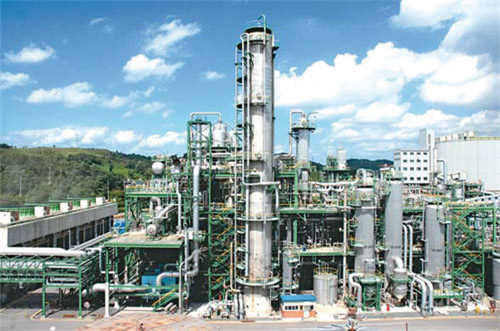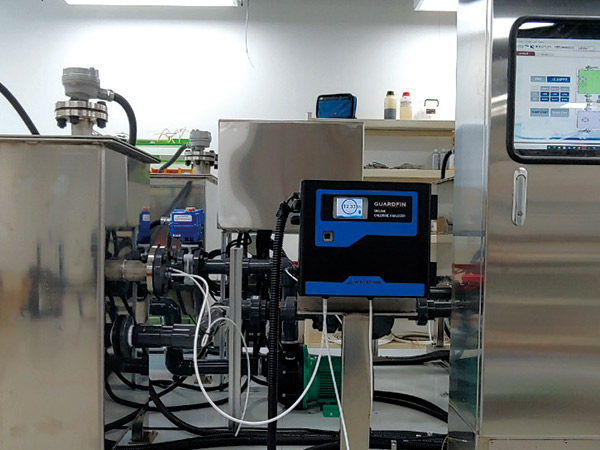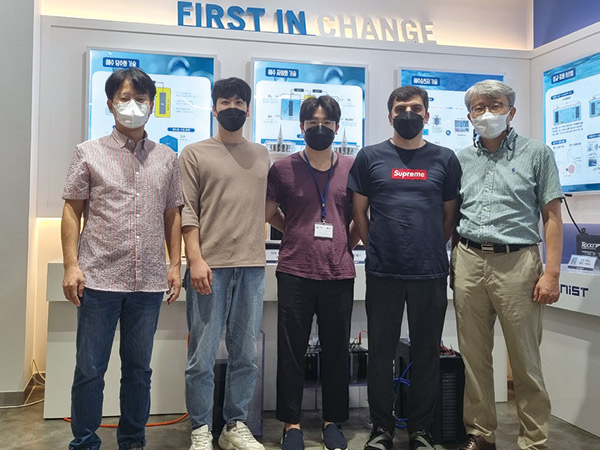
- TOGETHER
- UNIST and Ulsan city to raise competitiveness of chemical companies in Ulsan
content area
UNIST and Ulsan city to raise competitiveness of chemical companies in Ulsan
Active industry-academy collaboration between UNIST and enterprises at Ulsan has accomplished a steady flow of high-quality outcomes. Such cases of industry-academy collaboration have demonstrated a new possibility to local industries that the technologies developed through the R&D of UNIST can be applied to the manufacturing fields and commercialized.- Successful industry-academy collaboration leading to improvement in both process and sales efficiency
- “Next Generation Catalyst Center, Research Support HQ & Capro Co., Ltd, secure technical competitiveness and promote technical development to realize carbon neutral”

The Next Generation Catalyst Center and the Research Support HQ in UNIST have realized improved process efficiency and increased sale through industry-academy collaboration with Capro Co., Ltd. Capro Co., Ltd is a chemical company that runs its factory at the Petrochemical Complex in Ulsan Namgu. They are the sole manufacturer in Korea of caprolactam that is the raw material for nylon. Capro has been facing difficulties owing to the weakened price competition of imported raw materials. They have proceeded with process improvement through joint R&D with UNIST since August 2018. The Next Generation Catalyst and the Research Support HQ of UNIST focused on the research power based on the analysis equipment in order to resolve the problem of declined productivity of catalyst in the production process of caprolactam. After the study, the research team was able to resolve the problem through a method to reduce the catalyst poisoning substance that declines the activation on the catalyst surface. They were able to increase the efficiency of the manufacturing process for caprolactam in Capro Co., Ltd by more than 6%. Capro Co. Ltd has since accomplished annual cost reduction by more than 2.2 billion won. In addition, the company is expecting 22 billion won sales annually through the improved process.
The head of Research Support HQ, Shin Tae-Ju said, “UNIST is in an advantageous position to check the real technical development and collaborate with the companies as it is located nearby the Ulsan Petrochemical Complex.” He continued, “The present case was a significant achievement that increased the realistic sales by connecting the technology of a college to the companies. An official of Capro Co., Ltd said, “We grew into a company of middle standing based on the competitive production of raw materials, but we have suffered difficulties in the development of new technology as we were not equipped with independent research manpower and facilities.” He revealed, “UNIST in Ulsan City has resolved our difficulty of finding new technology. We received much actual help as they are well equipped with necessary infrastructure that would help with the improvement of process technology.”
UNIST Next Generation Catalyst Center and Capro Co., Ltd plan to move further toward technical development to realize the carbon neutral based on the strength of the present collaboration. They will develop the technology to reduce carbon dioxide that has emerged as a core issue in the recent discussions on climate change and renewable energy. Among these, especially they have a goal to secure the process technology to convert carbon dioxide emitted from the production process for petrochemical products into high-value substances. The head of the Next Catalyst Center Ahn Kwnag-Jin said, “There are unlimited fields in which UNIST can collaborate with the enterprises of Ulsan City to create an eco-friendly future as well as reinvent aged petrochemical facilities.” He said, “If UNIST collaborates with the enterprises of Ulsan City to develop the technology for catalyst conversion of carbon dioxide, we will realize a significant accomplishment of carbon neutral.
- Regional revitalization project succeeded in developing seawater battery-based sterilization & neutralization system for safe water production
- “Professor Kim Young-Shik of the School of Energy and Chemical Engineering and his team have developed a technology for sterilization and neutralization of seawater on the basis of seawater battery and accelerated the development of products with a local industrial company, Dongsung Industry Co., Ltd.”
Specialized ocean battery (Seawater battery) is a storage system for eco-friendly electrical energy that uses seawater. While new applied fields using this device such as seawater desalination and hydrogen production, etc., have received much attention, professor Kim Young-Shik and his team of the School of Energy and Chemical Engineering in UNIST have developed a sterilization and neutralization technology for seawater that utilizes the seawater battery. This technology uses sterilized substances generated during the process of recharging and electric discharge by utilizing sodium ion in seawater. When the seawater battery is recharged, chlorine is created while the sodium ion (Na⁺) moves among NaCl of seawater. Chlorine acts as a sterilization substance to remove bacteria or pathogens. On the other hand, when the seawater battery discharges, the sterilization substance combines with sodium ion to form salt.
This technology has the characteristic of natural sterilization and neutralization in the process by which the electricity is stored and discharged in the battery. Previous sterilization technology worked through electrolysis, but in this case, it was inconvenient to install a separate sterilization device or to use chemicals for sterilization. Professor Kim Young-Shik said, “The sterilization of seawater is a mandatory technology in the disinfection of land farms or the processing of vessels’ ballast water.” He explained, “The method to use seawater battery is more economic and eco-friendly than the sterilization system that brings additional cost or the previous technology that input chemicals with the risk of toxic byproducts.”
There is a local enterprise that has come forward to develop products with the above technology demonstrated in the laboratory. Dongsung Industry Co. Ltd is an Ulsan City-based company that manufactures equipment and materials for ships. Dongsung Industry has been successful in the development of the 200L level seawater battery-base hybrid sterilization and neutralization system through the local vitalization project under the supervision of UNIST and KIOST (Korea Institue of Ocean Science & Technology) and is about to release the new product.
This newly developed product has added a new concept of neutralization system that utilizes seawater battery to generate chlorine disinfectant through the previous electrolysis technology. It is a method of sterilizing seawater through electrolysis and neutralizing the disinfectant to a nonhazardous substance while using the electricity stored in the seawater battery. An official from Dongsung Industry said, “We have developed a system that conforms to the standard agreement of IMO (International Marine Organization) for the treatment of vessels’ ballast water. We plan to apply the system to the treatment of ballast water in a giant ship after we enlarge the size of the system. He revealed, “Ultimately, we expect to develop a sterilization and neutralization system that utilizes seawater battery exclusively rather than the present hybrid type battery and to reduce the consumption of electric power.” Professor Choi Yoon-Seok of the School of Energy and Chemical Engineering at UNIST who led the local vitalization project said, “The present project is a case where the eco-friendly energy technology developed by the college will bring a new possibility to the local industry.” He said, “We will continuously cooperate with local companies for the growth of new industry that can be utilized in the ocean environment.” An official of Ulsan City shared, “The local economy has been under depression owing to the COVID-19 crisis. I expect to see the creation of good quality jobs and vitalization of local economy in the region through the commercialization of prototypes that utilize the infrastructures of industry, academy and research as in the present project.



